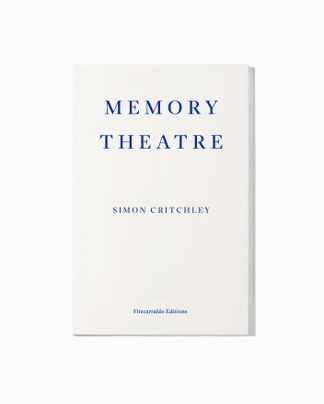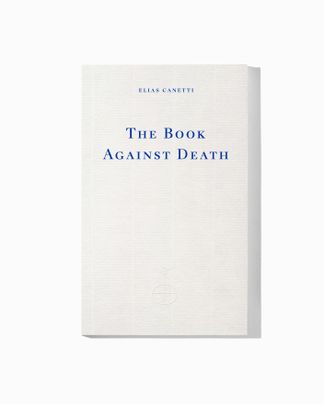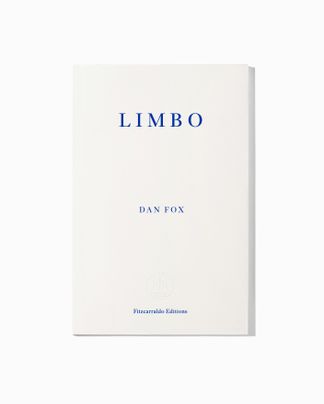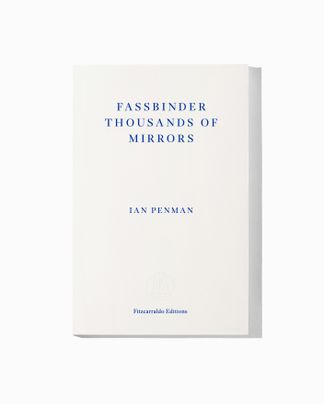Suicide is everywhere. It haunts history and current events. It haunts our own networks of friends and family. The spectre of suicide looms large, but the topic is taboo because any meaningful discussion must at the very least consider that the answer to the question – ‘is life worth living?’ – might not be an emphatic yes; it might even be a stern no. Through a sweeping historical overview of suicide, a moving literary survey of famous suicide notes, and a psychological analysis of himself, Simon Critchley offers us an insight into what it means to possess the all too human gift and curse of being of being able to choose life or death.
Five years after its initial publication, this revised edition of Notes on Suicide includes a new preface by the author adressing shifts in the discourse surrounding suicide, particularly in relation to social media.
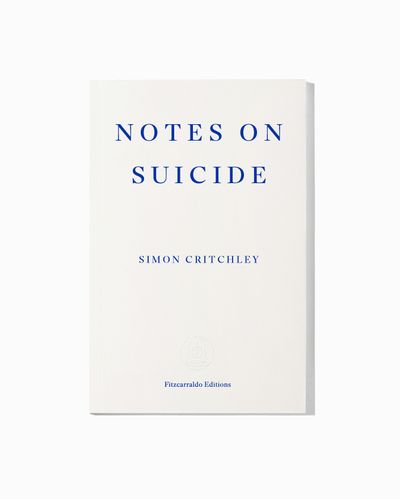
Notes on Suicide
Includes a new preface, written in 2020, by the author
Includes ‘Of Suicide’ by David Hume
Published 23 September 2015, French paperback with flaps, 112 pages
Notes on Suicide
Includes a new preface, written in 2020, by the author
I.
This book is not a suicide note.
Ten days after Edouard Levé handed in the manuscript of Suicide to his publisher in 2007, he hanged himself in his apartment. He was 42. Two years after Jean Améry’s On Suicide was published in 1976, the author took an overdose of sleeping pills. He was 65. In 1960, some eighteen years after Albert Camus had raised and – so he thought – resolved the question of suicide in The Myth of Sisyphus, he was killed in a car accident. He is alleged to have said that dying in a car crash is the most absurd of all deaths. The absurdity of his death is compounded by the fact he had an unused train ticket in his pocket. He was 46.
Let me say at the outset, at the risk of disappointing the reader, that I have no plans to kill myself… just yet. Nor do I wish to join the chorus of those who proclaim loudly against suicide and claim that the act of taking one’s own life is irresponsible and selfish, even shameful and cowardly, that people must stay alive whatever the cost. Suicide, in my view, is neither a legal nor moral offence, and should not be seen as such. My intention here is to simply try to understand the phenomenon, the act itself, what precedes it and what follows. I’d like to consider suicide from the point of view of those who have made the leap, or have come close to it – we might even find that the capacity to take that leap is what picks us out as humans. I want to look at suicide closely, carefully, and perhaps a little coldly, without immediately leaping to judgements or asserting moral principles like the right to life or death. We have to look suicide in the face, long and hard, and see what features, what profile, what inherited character traits and wrinkles emerge. Perhaps what we see when we look closely is our own distorted reflection staring back at us.
Of course, regardless of his answer, Albert Camus’s question in The Myth of Sisyphus is the right one. Judging whether life is worth living or not amounts to answering the fundamental philosophical question: should I live or die? To be or not to be? As we will soon see, the legal and moral framework that still shapes our thinking and judgement about suicide is hostage to a Christian metaphysics that declares that life is a gift of God. Therefore to take your own life is wrong, although Scripture nowhere explicitly forbids suicide (and, of course, Christ’s crucifixion could be interpreted as a quasi-suicidal act). In killing oneself, it is claimed by Christian theologians, one is assuming a power over one’s existence that only God should possess. Therefore, suicide is a sin.
From the nineteenth century onwards, this theological discourse was displaced by the rise of psychiatry, where suicide was not declared a sin but seen as a mental disorder requiring treatment of various kinds. This is still largely how we approach suicide: we speak readily (and not wrongly) of suicidal depression as an illness best approached through a combination of drugs – Lithium, say – and psychotherapy. But the implicit moral judgement on suicide that comes down to us from Christian theology remains intact and in force. Even when society or the state has taken the place of God, even when suicide is decriminalized, as it has been in the West for the past half century, it is still regarded as a kind of failing that invites an embarrassed response. We think that suicide is sad or wrong, often without knowing why. And we don’t know what to say, other than mouth a few empty platitudes.
(…)
‘An elegant, erudite and provocative book that asks us to reflect on suicide without moral judgment and panicked response. For Critchley, many reasons have been given for suicide, but what remains less remarked is how suicide distinguishes human creatures who grapple with melancholy in the face of losses that are too huge or enigmatic to fathom. Though there may be many reasons given within philosophy or popular culture, there are also some simple, insistent truths that do forestall such an action. In his view, “suicide saddens the past and abolishes the future,” establishing a problematic framework for grasping the whole of a life. This text gestures towards what makes us forgetful about suicide: wondrous and recurring moments when we find ourselves “enduring in the here and now.”’
— Judith Butler
‘No one ever lacks a good reason for suicide, wrote Cesare Pavese. With passionate lucidity and philosophical intelligence, Simon Critchley explores what these reasons might be, bracketing simple moral judgement and trying to fight his way past the social, psychical and existential blockages that inhibit us whenever we try to think about this ever-baffling issue.’
— Lars Iyer, author of Wittgenstein Jr
‘For most arguments about suicide, there’s a counter argument, and Critchley makes us think anew about old questions. Is suicide selfish? I believed not until a member of my family killed themselves and the pain it caused persuaded me that it’s both selfish and stupid. But Critchley reminds us that our responses to suicide are distorted by anger, prejudice and inarticulacy. We must, he argues, stop looking for life’s great meaning and instead savour “little daily miracles, matches struck in the darkness”. And we must talk about suicide without shame or sanctimony. This book is a good place to start.’
— Max Liu, Independent
‘Critchley encourages us to seek out moments of ecstasy in the everyday, glimpses of the sublime in the commonplace. He ends with a beautiful meditation on what it means to open ourselves to the gentle indifference of the world and to do so tenderly, with love.’
— Matthew Clemente, Los Angeles Review of Books
‘[T]his intense book is an instance of thought born in the hour of anguish, which eloquently makes the case for suicide not as an act to be pitilessly condemned, but a possibility for which any of us might be thankful.’
— Rob Doyle, Irish Times
‘This delicate and sensitive book only aims “to try to understand”, not to aspire to a goal beyond our ambit. We may gain something from the attempt – as we gain plenty from Critchley’s writing – but we can never gain everything, a complete sense of what suicide, to put it falteringly, means. To have this would require us to stand outside of life, to see it in the round. But we can’t, and that’s our curse – in the fullest sense, the condition of living a life. Notes on Suicide shows us not how to understand, but how to realise what we don’t know, can never know, and what it is to deal with that awareness.’
— Cal Revely-Calder, 3:AM Magazine
‘[A] thoughtful and incisive insight into a subject that is often avoided, or uncomfortably discussed.’
— The Messy Booker
‘Critchley is generous without being platitudinous, rigorous but not overbearing. Remarkably for a disquisition on self-killing, one comes away from it feeling curiously chipper.’
— Houman Barekat, Vol. 1 Brooklyn
Praise for Memory Theatre
‘Memory Theatre is a brilliant one-of-a-kind mind-game occupying a strange frontier between philosophy, memoir and fiction. Simon Critchley beguiles as he illuminates.’
— David Mitchell, author of The Bone Clocks
‘Novella or essay, science-fiction or memoir? Who cares. Chris Marker, Adolfo Bioy Casares and Frances Yates would all have been proud to have written Memory Theatre.’
— Tom McCarthy, author of C
‘This is a remarkable [fiction] debut: rich, profound and clever, but not oppressively so, and often very funny.’
— Nicholas Lezard, Guardian
Simon Critchley is Hans Jonas Professor of Philosophy at the New School for Social Research in New York. His previous books include On Humour, The Book of Dead Philosophers, How to Stop Living and Start Worrying, Impossible Objects, The Mattering of Matter (with Tom McCarthy), The Faith of the Faithless, Stay, Illusion!: The Hamlet Doctrine (with Jamieson Webster), Bowie, and Notes on Suicide (also published by Fitzcarraldo Editions). He is series moderator of ‘The Stone’, a philosophy column in the New York Times, to which he is a frequent contributor.

